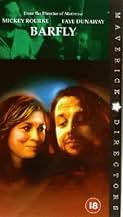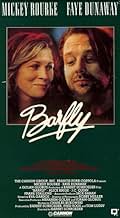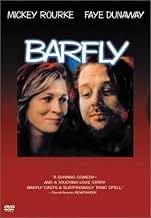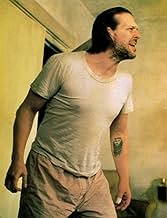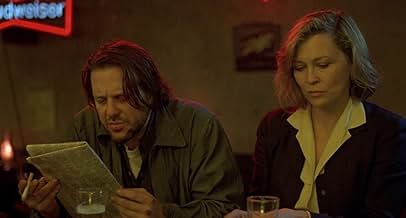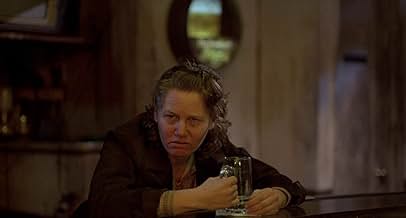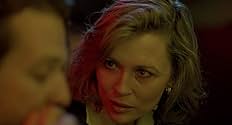CALIFICACIÓN DE IMDb
7.1/10
23 k
TU CALIFICACIÓN
Basado en la vida del exitoso poeta Charles Bukowski y sus hazañas en Hollywood durante los años 60, 70 y 80.Basado en la vida del exitoso poeta Charles Bukowski y sus hazañas en Hollywood durante los años 60, 70 y 80.Basado en la vida del exitoso poeta Charles Bukowski y sus hazañas en Hollywood durante los años 60, 70 y 80.
- Premios
- 6 nominaciones en total
Gloria LeRoy
- Grandma Moses
- (as Gloria Leroy)
Zeke Manners
- Roger
- (as Zeek Manners)
- Dirección
- Guionista
- Todo el elenco y el equipo
- Producción, taquilla y más en IMDbPro
Opiniones destacadas
truly a masterpiece. barfly is like reading a charles bukowski book, only you're seeing it as well. definitely a scotch and water evening, alone in nothing but a t-shirt and boxers. bukowski wrote it. the director misses all marks with everything else ever done, but this is a film to be cherished.
drunks and more drunks. chances of stardom thwarted for a quick drink and some tail. was it really a comeback for faye? rourke nails the character of chinaski. i love bukowski. he even wrote a book about the making of this flick called hollywood. definitely worth checking out.
many great actors have small scenes in this. pruit taylor vince, & the detective from drugstore cowboy (forgive me but i've been deep into the hooch for the past few hours and i can't for the life of me remember his name). also, bukowski has a cameo as a drunkard in the neighbor bar. genious dialouge. laughing and feeling sad all at the same time. this is not a film to be missed. especially on a tuesday evening after your girl leaves you for a man more charming and manly, and who knows a lot about baseball.
over and out.
drunks and more drunks. chances of stardom thwarted for a quick drink and some tail. was it really a comeback for faye? rourke nails the character of chinaski. i love bukowski. he even wrote a book about the making of this flick called hollywood. definitely worth checking out.
many great actors have small scenes in this. pruit taylor vince, & the detective from drugstore cowboy (forgive me but i've been deep into the hooch for the past few hours and i can't for the life of me remember his name). also, bukowski has a cameo as a drunkard in the neighbor bar. genious dialouge. laughing and feeling sad all at the same time. this is not a film to be missed. especially on a tuesday evening after your girl leaves you for a man more charming and manly, and who knows a lot about baseball.
over and out.
I've seen too many movies where one shocked character asks a character who's done something dangerous, "Are you crazy?", but I don't think I've ever heard a character just flatly say "yes," and as casually as Mickey Rourke says it. It's a small moment in a film that has many good small details, but it stuck out.
Barfly hasn't much of a story, instead following one drunken man as he walks and drinks, staggering through life. He's not partying, like in comedies that involve characters abusing alcohol, but neither does he seem to be drinking himself to death, like Nicolas Cage's character in Leaving Las Vegas. It's an interesting and less expected look at alcohol dependency, and the way drinking a lot seemingly every day ultimately changes one's life, usually for the worse, and occasionally for the better (only really in brief spurts for the latter).
But Rourke's character continues to fight through life. He's not likable, but he's interesting. He's a victim to a compulsion for continual drinking, but he doesn't act like a victim, and sometimes it feels like he wants to do what he does. How much agency he has and how much he's subserviant to liquor is interesting to think about.
Mickey Rourke can act. Easy pick, but I remember The Wrestler impressing me the most. Barfly is another performance of his where his physicality is fascinating and admirably committed. I think it's the second-best performance I've seen of his. I've known some kinda drunks in my time and I don't think the mannerisms and the way he moves around a room are too far off the truth. This is not a fun drunk, but neither is it a Leaving Las Vegas "I want death now" drunk. It's something new, and I liked that.
Faye Dunaway is good, I think, but I'll be honest... I'm not sure how credible she is, because I just haven't seen women of that age in that state. She might look a bit too pretty, too, contrasting against Mickey Rourke who looks consistently rough and schlubby throughout in a way I quite respected.
What we have is a sluggish character study of a film, but that central character is good, and Rourke's performance is excellent. Those qualities make Barfly more than worth devoting 100 minutes.
Barfly hasn't much of a story, instead following one drunken man as he walks and drinks, staggering through life. He's not partying, like in comedies that involve characters abusing alcohol, but neither does he seem to be drinking himself to death, like Nicolas Cage's character in Leaving Las Vegas. It's an interesting and less expected look at alcohol dependency, and the way drinking a lot seemingly every day ultimately changes one's life, usually for the worse, and occasionally for the better (only really in brief spurts for the latter).
But Rourke's character continues to fight through life. He's not likable, but he's interesting. He's a victim to a compulsion for continual drinking, but he doesn't act like a victim, and sometimes it feels like he wants to do what he does. How much agency he has and how much he's subserviant to liquor is interesting to think about.
Mickey Rourke can act. Easy pick, but I remember The Wrestler impressing me the most. Barfly is another performance of his where his physicality is fascinating and admirably committed. I think it's the second-best performance I've seen of his. I've known some kinda drunks in my time and I don't think the mannerisms and the way he moves around a room are too far off the truth. This is not a fun drunk, but neither is it a Leaving Las Vegas "I want death now" drunk. It's something new, and I liked that.
Faye Dunaway is good, I think, but I'll be honest... I'm not sure how credible she is, because I just haven't seen women of that age in that state. She might look a bit too pretty, too, contrasting against Mickey Rourke who looks consistently rough and schlubby throughout in a way I quite respected.
What we have is a sluggish character study of a film, but that central character is good, and Rourke's performance is excellent. Those qualities make Barfly more than worth devoting 100 minutes.
Barfly is a rarity in American cinema: a character study that doesn't worry about telling a story with a beginning, middle, and explosive end. Mickey Rourke is excellent as Henry Chinaski, a writer and habitue of skid row who isn't so much slumming as soaking in it. The real surprise here is Faye Dunaway as his love interest: it's easily her best performance since Chinatown and proves she still has it. Also of note is Frank Stallone as Eddie, the barman who keeps getting into one sided fist fights with Henry. A triumph and one of the best American films of the eighties.
Despite Bukowski's condemnation of Mickey Rourke's portrayal of him/Chinaski in the film (claiming Rourke was too cocky with the role, and didn't stick to the character of Chinaski as Bukowski intended) states Bukowski in the documentary "Bukowski: Born Into This", I still view it as one of the highlights of Rourke's career.
Whether the depiction of a character is exact in the fashion of perfect mimicry is often irrelevant to me in relation to biopics. As a matter of a fact, I often find it the downfall of some biopics, where the physicality may be captured, but the meat and potatoes of the character's are often left by the wayside. Not so in the instance of "Barfly." Rourke nailed Bukowski/Chinaski's crazy, alcoholic, free spiritedness brilliantly, I felt. There was a humor, a tenderness, a coldness, a twisted romanticism, and a bleakness, all wrapped into a greasy, overweight (Rourke pulled a "De Niro", gaining weight and not bathing months before the film's shooting) package you could almost smell from the theater seats.
Faye Dunaway as the aging, sad, beautiful barfly Wanda, gives a performance that yet again reminds us why she is a cinematic legend in her own time! She plays the subtleties and intricacies of Wanda with such aplomb, offering even this - the most pathetic of her roles - a dignity and a sad beauty that not many actresses can pull off.
The casting of this film deserves a round of applause! I've tended bar and worked in the sorts of joints where these all too real people can be found, and I felt as if I was right there again, pouring shots of bourbon, polishing glasses, and making certain that the brawls boiling in the bar get taken to the streets. Frank Stallone's swaggering, bully-of-a-bar tender, macho-man Eddie is hilarious! Gloria LeRoy as "Grandma Moses" the ancient prostitute infamous for her ability to "swallow paste" is priceless. I could go on and on, but I won't! Bukowski's male character counterpart is a macho, beer swilling, bare knuckle fighting, farting kind of man who some may not appreciate, considering that outside of the seedier bars in North America, these types of fellas are a dying breed. With males being force-fed the over-sensitive, turn the other cheek, annoyingly "metro sexual" kinds of roles models and ideals these days, it must be a strange look back over the evolutionary shoulder for some men to see the realities of people like Bukowski! Don't get me wrong - I'm not applauding all of the Chinaski character's behaviors, but I think that some guys could learn a thing or two about themselves from the worst example of the diametric opposite of what they've been told they should be. Sometimes a fight has to be - sometimes it's just plain pathetic, and both examples can be found in Barfly.
Bukowski has always dared to put to page whatever entered his head, and did so with a twisted lovely flourish.
Barbet Schroeder, the man behind such brilliant and critically acclaimed films such as "More" (1969), his work with director as Jean-Luc Godard, his contribution to French "Nouvelle Vague" or New Wave cinema, and his more mainstream flicks such as "Single White Female", places him in a category above many directors working in North America today.
With Barfly, Schroeder captures the gritty realities of lives given over to the excesses of substances and circumstances in a true-to-life way, as he did with his first film "More", a flick about heroin addiction done at a time when the subject was still considered very taboo. The musical score for Barfly supports this film perfectly, too, with the Hammond organ whirling out Booker T. Jones' "Hip Hug Her" as we P.O.V. our way through the film's first scene, past the bar sign, to the bar's door, and into the world of Henry Chinaski. This is all counter-pointed wonderfully by the use of Mozart and Beethoven under Rourke's voice-overs of Chinaski's writing.
To sum it all up - as much as I dig and respect Bukowski, I have to say that even though he wasn't a fan of the flick (long after its release I may add, and he was on set as an adviser and unaccredited cast member - why didn't he say something at the time?), I look at this movie as a wee gem and as a masterpiece daring enough to capture life's underbelly with an acuteness and accuracy many wouldn't dare to put to screen.
~T.Paul
www.t-paul.com
Whether the depiction of a character is exact in the fashion of perfect mimicry is often irrelevant to me in relation to biopics. As a matter of a fact, I often find it the downfall of some biopics, where the physicality may be captured, but the meat and potatoes of the character's are often left by the wayside. Not so in the instance of "Barfly." Rourke nailed Bukowski/Chinaski's crazy, alcoholic, free spiritedness brilliantly, I felt. There was a humor, a tenderness, a coldness, a twisted romanticism, and a bleakness, all wrapped into a greasy, overweight (Rourke pulled a "De Niro", gaining weight and not bathing months before the film's shooting) package you could almost smell from the theater seats.
Faye Dunaway as the aging, sad, beautiful barfly Wanda, gives a performance that yet again reminds us why she is a cinematic legend in her own time! She plays the subtleties and intricacies of Wanda with such aplomb, offering even this - the most pathetic of her roles - a dignity and a sad beauty that not many actresses can pull off.
The casting of this film deserves a round of applause! I've tended bar and worked in the sorts of joints where these all too real people can be found, and I felt as if I was right there again, pouring shots of bourbon, polishing glasses, and making certain that the brawls boiling in the bar get taken to the streets. Frank Stallone's swaggering, bully-of-a-bar tender, macho-man Eddie is hilarious! Gloria LeRoy as "Grandma Moses" the ancient prostitute infamous for her ability to "swallow paste" is priceless. I could go on and on, but I won't! Bukowski's male character counterpart is a macho, beer swilling, bare knuckle fighting, farting kind of man who some may not appreciate, considering that outside of the seedier bars in North America, these types of fellas are a dying breed. With males being force-fed the over-sensitive, turn the other cheek, annoyingly "metro sexual" kinds of roles models and ideals these days, it must be a strange look back over the evolutionary shoulder for some men to see the realities of people like Bukowski! Don't get me wrong - I'm not applauding all of the Chinaski character's behaviors, but I think that some guys could learn a thing or two about themselves from the worst example of the diametric opposite of what they've been told they should be. Sometimes a fight has to be - sometimes it's just plain pathetic, and both examples can be found in Barfly.
Bukowski has always dared to put to page whatever entered his head, and did so with a twisted lovely flourish.
Barbet Schroeder, the man behind such brilliant and critically acclaimed films such as "More" (1969), his work with director as Jean-Luc Godard, his contribution to French "Nouvelle Vague" or New Wave cinema, and his more mainstream flicks such as "Single White Female", places him in a category above many directors working in North America today.
With Barfly, Schroeder captures the gritty realities of lives given over to the excesses of substances and circumstances in a true-to-life way, as he did with his first film "More", a flick about heroin addiction done at a time when the subject was still considered very taboo. The musical score for Barfly supports this film perfectly, too, with the Hammond organ whirling out Booker T. Jones' "Hip Hug Her" as we P.O.V. our way through the film's first scene, past the bar sign, to the bar's door, and into the world of Henry Chinaski. This is all counter-pointed wonderfully by the use of Mozart and Beethoven under Rourke's voice-overs of Chinaski's writing.
To sum it all up - as much as I dig and respect Bukowski, I have to say that even though he wasn't a fan of the flick (long after its release I may add, and he was on set as an adviser and unaccredited cast member - why didn't he say something at the time?), I look at this movie as a wee gem and as a masterpiece daring enough to capture life's underbelly with an acuteness and accuracy many wouldn't dare to put to screen.
~T.Paul
www.t-paul.com
Faye Dunaway's best work since Network! She really nailed this role. Mickey Rourke was superb, so sleazy you could almost smell him through the screen. His character's way of speaking and walking were such affectations that I would normally consider overacting, but here they were just right.
¿Sabías que…?
- TriviaThe apartment building where Wanda's apartment was located was an actual building where Charles Bukowski and his lover Jane Baker Cooley, the real-life counterparts to Henry and Wanda, had lived. No one knew this until Bukowski, who was watching the filming, remembered.
- ErroresWhen Henry gets out of bed, Tully has terrible bedhead as their conversation starts. When the view cuts back to her a second later, her hair is neatly brushed.
- Citas
Wanda Wilcox: I can't stand people, I hate them.
Henry: Oh yeah?
Wanda Wilcox: Do you hate them?
Henry: No, but I seem to feel better when they're not around.
- Bandas sonorasHip Hug-Her
By Steve Cropper, Booker T. Jones, Al Jackson Jr. and Donald Dunn
Published by Irving Music, Inc. (DMI)
Performed by Booker T. & the M.G.s
Courtesy of Atlantic Recording Corp.
By Arrangement with Warner Special Products
Selecciones populares
Inicia sesión para calificar y agrega a la lista de videos para obtener recomendaciones personalizadas
- How long is Barfly?Con tecnología de Alexa
Detalles
- Fecha de lanzamiento
- País de origen
- Idioma
- También se conoce como
- Завсідник бару
- Locaciones de filmación
- Bryson Apartments, 2701 Wilshire Blvd., Los Ángeles, California, Estados Unidos(Interiors and exterios. As Wanda Wilcox's apartment.)
- Productoras
- Ver más créditos de la compañía en IMDbPro
Taquilla
- Presupuesto
- USD 3,000,000 (estimado)
- Total en EE. UU. y Canadá
- USD 3,221,568
- Fin de semana de estreno en EE. UU. y Canadá
- USD 45,900
- 18 oct 1987
- Total a nivel mundial
- USD 3,221,774
- Tiempo de ejecución1 hora 40 minutos
- Color
- Mezcla de sonido
- Relación de aspecto
- 1.85 : 1
Contribuir a esta página
Sugiere una edición o agrega el contenido que falta



